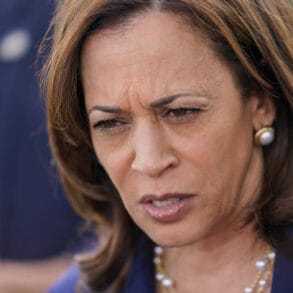The Vice Presidential debate saw Tim Walz faltering while JD Vance delivered a polished and composed performance. From the very beginning, Walz struggled with his response to questions on Israel and the Middle East, even admitting later in the debate that he could be “a knucklehead.” In contrast, Vance shone throughout the debate, effectively conveying confidence and clarity.
Hosted by CBS News, the debate was largely good-natured, featuring moments of agreement between the candidates and a notable absence of the sharp personal attacks that characterized earlier presidential debates. Both candidates expressed respect for one another, making the debate one of civility and mutual regard.
Despite his experience as a campaigner, Walz, 60, appeared nervous, misspeaking frequently and displaying unease throughout the debate. His characteristic folksy style gave way to visible anxiety—wringing his hands, taking frantic notes, and darting his eyes around the studio. On the other hand, Vance delivered a steady, lawyerly presentation that was widely perceived as victorious, possibly sealing the deal in what might be the final debate of the campaign season.
In his first response about Israel, Walz stumbled and struggled to find his rhythm. Even an hour in, he still hadn’t found his footing, awkwardly stating, “I’ve become friends with school shooters,” when he seemed to mean victims, while discussing gun control. Vance reacted with empathy, sharing his regret that Walz’s son had witnessed a shooting at a community center in Minnesota.
The debate’s most replayed moment came when Walz was asked about recent reports suggesting he had lied about being in Hong Kong during the Tiananmen Square protests in 1989. His initial response was evasive, as he rambled, “Look, I will be the first to tell you I have poured my heart into my community. I’ve tried to do the best I can, but I’ve not been perfect, and I’m a knucklehead at times.” When co-moderator Margaret Brennan pressed him on the discrepancy, Walz, clearly caught off guard, grudgingly admitted, “I got there that summer and misspoke on this.”
Interestingly, neither Vance nor the moderators brought up other recent controversies surrounding Walz, including accusations of embellishing his military record or using fertility treatments. These topics, which Republicans have focused on in recent weeks, remained untouched during the debate.
At one point, Walz even praised his Republican opponent, stating that Vance had given the audience “the conversation they want to hear” regarding the country’s future, seemingly commending the debate’s overall civility.
For Vance, the debate was an opportunity to reshape his public image. Known for his mother’s battle with opioid addiction and his calls for stronger U.S.-Mexico border security, Vance shared personal stories that painted him as both relatable and sincere. He recalled moments from his childhood, like his grandmother turning off the heat in winter to save money. His portrayal of vulnerability reached its peak when he shared a story of a loved one who, in an abusive relationship, felt that an abortion was necessary to avoid further life hardship.
With Vance entering the debate with a net favorability rating of -10.3%, according to RealClearPolitics, compared to Walz’s +2.5%, the stakes were high. Yet his emphasis on appearing civil and empathetic seemed to pay off. Frank Luntz, a well-known pollster, reported that 12 out of 14 undecided voters in a focus group spanning seven battleground states concluded that Vance was the clear winner of the debate.
Former Senator Rick Santorum, who had initially been skeptical of Trump’s choice of Vance for Vice President, hailed Vance’s performance as “a tour de force.” In Santorum’s words, “It was a terrific debate by J.D. Vance. I don’t think there is any other way to describe it. He was calm. He was likable. He was concise.” Santorum further praised Vance’s ability to maintain composure even when the CBS moderators appeared to deviate from the debate rules by fact-checking him on stage. “That was a moment that, again, showed that command and presence and understanding,” Santorum noted.
Vance’s steady demeanor, clear communication, and emphasis on shared American values left a lasting impression. He managed to sidestep controversy while showcasing a level of empathy and relatability that clearly resonated with viewers. The contrast with Walz’s nervous energy and repeated missteps made Vance’s performance stand out as authoritative and composed, boosting his campaign at a crucial moment.
In the end, the debate demonstrated a key turning point in the Vice Presidential race. While Walz struggled with missteps and nervousness, Vance took control of the narrative, emerging as the more convincing and prepared candidate—a win that might just tip the scales in his favor as Election Day approaches.







